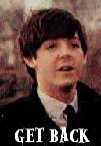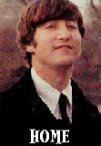

QUESTION : This afternoon we're visiting with four young men, and if I mention their first names - Paul, George, Ringo and John - I doubt you'd know about whom we're speaking. But if I said we're here this afternoon with the Beatles and if we were in England, I think we'd get a great big rousing hurrah, wouldn't we, boys?
PAUL: I don't know.
QUESTION: Now Paul, tell us, how did the Beatles get going? How did you start?
PAUL: It's a funny story really. It was back in the old days. We were all at school together, we grew up at school as teenage buddies. It developed from there.
QUESTION: Did you sing together around school?
PAUL: Yeah. George and I were at school together, John was next door, and Ringo was at Butlins. We just started playing guitars and things. It went on from there, as far as I'm concerned.
QUESTION: You say those were the olden days. Within the last year you have mushroomed tremendously in popularity. What levered this great rage for the Beatles?
PAUL: Well, it's funny really. I think it was the Palladium show, the television show in England. Then following hot in the footsteps we had the Royal Variety Command Performance for the Queen Mother and it all went from there, really. The national newspapers got a hold of it and they got a hold of Ringo, you know. A lot of columnists got onto the idea and started calling it Beatlemania.
QUESTION: George, what is the status of rock'n'roll in England today? Is that what you call your music?
GEORGE: No, not really. We don't like to call it anything. The critics and the people who write about it have to call it something. They didn't want to say it was rock'n'roll because rock was supposed to have gone out about five years ago. They decided it wasn't really rhythm and blues, so they called it the Liverpool Sound, which is stupid, really. As far as we are concerned, it's the same as the rock from five years ago.
QUESTION: Can you describe the Liverpool Sound?
GEORGE: Oh, It's more like old rock, but everything's just a bit louder. More bass and bass drum and everybody sort of sings loud and shouts, that's it.
QUESTION: Is Liverpool sound then, the sound in the U.K. today?
GEORGE: Yeah, everybody's making records in that style.
QUESTION: Well, let's ask Ringo here. You're the drummer. We caught your act at the Olympia the other evening. How long have you been beating those skins?
RINGO: About five years now. I've been with the boys about eighteen months and with other groups before that.
QUESTION: Since you boys have gained your current popularity, have there been any other organizations trying to imitate you or perhaps take the thunder away from you? Let's ask John Lemon this.
JOHN: Well, I suppose a couple of people have jumped on the bandwagon, but it doesn't really matter because it promotes the whole idea of us if we're away. There's a few little Beatles still going to remind people of us.
QUESTION: Paul, let's go back to you for a moment. When anyone sees your picture, the first thing that strikes them, naturally, is your hairdo. Some people have written that you have a "sheepdog" cut, or perhaps, an "early Caesar." What do you call it?
PAUL: To us, it just sort of seems like a natural thing. We came out of the swimming baths one day, and you know how it is, your hair kind of flops about afterwards. It stayed that way, you see. Then the papers got hold of it and they called it the Beatle style. I suppose we go along with them now.
QUESTION: Do you go to the barber at all?
PAUL: Now and then. Do and don't.
QUESTION: Just to keep it trimmed?
PAUL: Yeah, but sometimes we do it ourselves. The thing is, it's really only our eyebrows that are growing upwards.
QUESTION: We've been told in England today, there's this Beatlemania going on. What would you say Beatlemania is? All the girls scream whenever they see you and perhaps faint waiting in line. Let's be immodest a moment, what's the big attraction?
JOHN: I think it's like a dressing gown. George's dressing gown is definately a big attraction.
PAUL: I don't think any of us really know what it is. We've been asked this question and awful lot of times, but we've never been able to come up with an answer. I think it's a collection of so many different things like: happening to be at the right time, a little bit of originality in the songs, a different sound. Maybe the gimmick of the haircut as well, the look, getting into the national press at the right time.
JOHN: All these things and more fab listeners.
QUESTION: I understand you boys write your own material.
PAUL: John and I write them. This is Paul speaking.
QUESTION: Do you get together regularly or does an idea pop in your mind and you say, let's sit down and do it?
PAUL: If an idea does pop in your mind, then you do sit down and say let's do it, yeah. If there are no ideas and say we've been told we've got a recording date in about two days' time, then you've got to sit down and sort of slug it out. You normally get just a little idea which doesn't seem bad and you go on and it builds up from there. It varies every time.
QUESTION: Paul, we've seen you here at the Olympia. Can you compare the French audiences with what you're familiar with back in England?
PAUL: There's a lot of difference because in England, you see, the audiences are seventy-five percent female, here it's seventy-five percent male. That's the main difference really. You're still appreciated, but you don't get the full noise and atmosphere of a place.
JOHN: No screams.
QUESTION: Why is it seventy-five percent boys?
GEORGE: I think they don't let the girls out at night in France.
JOHN: I think it's your dressing gown.
GEORGE: Somebody said that they still have chaperons, a lot of them, you see. Whereas in England, they're out. It's the same in Germany - all the boys like rock. It's usually the same on the Continent. I don't really know why.
QUESTION: Paul, we see "I Want to Hold Your Hand" is number one on the Hit Parade. How did you come to write that?
PAUL: Let's see, we were told we had to get down to it. So we found this house when we were walking along one day. We knew we had to really get this song going, so we got down in the basement of this disused house and there was an old piano. It wasn't really disused, it was rooms to let, we found this old piano and started banging away.
JOHN: And there was a little old organ.
PAUL: Yeah, there was a little old organ too. So we were having this informal jam and we started banging away. Suddenly, a little bit came to us, the catch line. So we started working on it from there. We got our pens and paper out and just wrote down the lyrics. Eventually, we had some sort of a song, so we played it for our recording manager and he seemed to like it. We recorded it the next day.
QUESTION: Do all your songs have a basic theme or message?
PAUL: No they don't, but there's one thing that nearly always semms to run through our songs. People point it out to us. It's that I, You, Me always seem to be in the title. "I Want to Hold Your Hand," "She Loves You", "Love Me Do," and things like this. I think the reason for that is we try and write songs which are a bit more personal than others, you see. I, Me, and You in the titles make the songs more personal, but that's the only basic message that runs through our songs.
QUESTION: And you coined this "Yeah, Yeah, Yeah." Isn't that sweeping England right now.?
JOHN: Well, yeah. That was sort of the main catch phrase from "She Loves You." We'd written the song and then suddenly we needed more so we added yeah, yeah, yeah. It caught on, so now they use it if they're trying to be "with it" or "hip."
QUESTION: Paul, what do you think of your trip to the States? I understand in about a week you're going to be on The Ed Sullivan Show.
PAUL: Yeah, that's right. We're going to do the show in New York and we're taping one for later release. Then we go down to Miami, I can't wait, and we do another Sullivan show there. Before that, we do Carnegie Hall, don't we?
QUESTION: How were you selected for Ed Sullivan? Was he in England and caught your act or something?
GEORGE: We were arriving from Stockholm into London airport and at the same time the Prime Minister and the Queen Mother were also flying out, but the airport was overrun with teenagers, thousands of them waiting for us to get back. And Ed Sullivan was supposed to have arrived at that time and wondered what was going on. Also our manager went over to the States with another singer called Billy J. Kramer and he did a couple of TV shows over there. While he was there our manager got the bookings with Ed Sullivan, but he'd also heard of us from this London airport thing.
QUESTION: Is there a movie in the future?
PAUL: Yeah. We've been asked by United Artists to do a feature.
QUESTION: Will it be dramatic or just wrapped around your singing?
PAUL: We don't know yet what it's going to be like. I don't think we'll do an awful lot of acting. I think it will be written around the sort of people we are. There'll be four characters in it, very like us.
QUESTION: Do you plan to compose two or three songs specifically for the film?
GEORGE: Actually, we have to compose six songs specifically for the film.
PAUL: We've got to get that down too. That's a job.
QUESTION: Then you boys haven't really had much of a chance to see Paris, have you?
GEORGE: Not really, no.
QUESTION: How about the French girls compared to the British girls.
RINGO: We haven't seen any yet.
JOHN: Well, Im married. I didn't notice them.
QUESTION: Well go back to Paul then. You're single.
PAUL: Yeah. I think the French girls are fabulous.
GEORGE: We have seen more French boys than French girls so, I mean, we can't really tell.
QUESTION: Perhaps when you get to The Ed Sullivan Show there'll be more girls for you.
PAUL: I hope so, yeah.
QUESTION: Any of you ever been to America before?
GEORGE: Yeah, me. I went in September, just for a holiday. For three weeks.
QUESTION: Well, I see our time is up boys.
Thank you, Beatles, for being our guests this afternoon.

